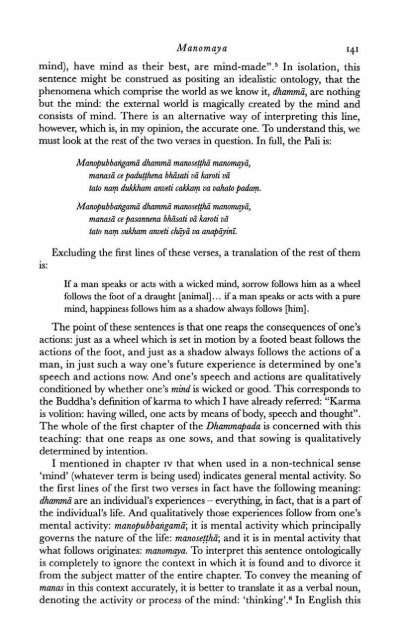Identity and Experience_Hamilton_1996
Identity and Experience_Hamilton_1996
Identity and Experience_Hamilton_1996
You also want an ePaper? Increase the reach of your titles
YUMPU automatically turns print PDFs into web optimized ePapers that Google loves.
mind), have mind as their best, are mind-made".= In isolation, this<br />
sentence might be construed as positing an idealistic ontology, that the<br />
phenomena which comprise the world as we know it, dhammi, are nothing<br />
but the mind: the external world is magically created by the mind <strong>and</strong><br />
consists of mind. There is an alternative way of interpreting this line,<br />
however, which is, in my opinion, the accurate one. To underst<strong>and</strong> this, we<br />
must look at the rest of the two verses in question. In full, the Pali is:<br />
Manopubbarigama- dhummii manosethi manomayi,<br />
manasi ce padut.hna bhati vii karoti vi<br />
tato nam duwdulm anveti cakkarp va vahato padam.<br />
Manopubbarigami dhummii rnanoset.h- manomayii,<br />
manasi ce pasannena bhiisati vii karoti vZ<br />
tato nam suhm anveti c&yi va anap@inE<br />
Excluding the first lines of these verses, a translation of the rest of them<br />
If a man speaks or acts with a wicked mind, sorrow follows him as a wheel<br />
follows the foot of a draught [animal]. . . if a man speaks or acts with a pure<br />
mind, happiness follows him as a shadow always follows Fim].<br />
The point of these sentences is that one reaps the consequences of one's<br />
actions: just as a wheel which is set in motion by a footed beast follows the<br />
actions of the foot, <strong>and</strong> just as a shadow always follows the actions of a<br />
man, in just such a way one's future experience is determined by one's<br />
speech <strong>and</strong> actions now. And one's speech <strong>and</strong> actions are qualitatively<br />
conditioned by whether one's mind is wicked or good. This corresponds to<br />
the Buddha's definition of karma to which I have already referred: "Karma<br />
is volition: having willed, one acts by means of body, speech <strong>and</strong> thought".<br />
The whole of the first chapter of the Dhammapada is concerned with this<br />
teaching: that one reaps as one sows, <strong>and</strong> that sowing is qualitatively<br />
determined by intention.<br />
I mentioned in chapter IV that when used in a non-technical sense<br />
'mind' (whatever term is being used) indicates general mental activity. So<br />
the first lines of the first two verses in fact have the following meaning:<br />
dhamma' are an individual's experiences - everything, in fact, that is a part of<br />
the individual's life. And qualitatively those experiences follow from one's<br />
mental activity: rnanopubbarigami; it is mental activity which principally<br />
governs the nature of the life: manosetfiii; <strong>and</strong> it is in mental activity that<br />
what follows originates: manomaya. To interpret this sentence ontologically<br />
is co'mpletely to ignore the context in which it is found <strong>and</strong> to divorce it<br />
from the subject matter of the entire chapter. To convey the meaning of<br />
manas in this context accurately, it is better to translate it as a verbal noun,<br />
denoting the activity or process of the mind: 'thinking'.6 In English this


